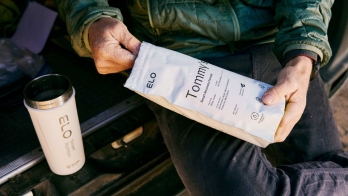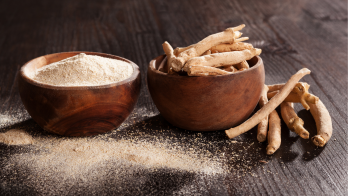Can drinking coffee help you live longer? It might depend on your genes.
Coffee is one of the most well-loved beverages around the globe, but emerging evidence shows it might play a bigger role than just getting you out of bed. Here’s what science has to say about coffee and its impact on your health, longevity and genetics.

Otherwise known as the “nectar of the gods”, black coffee has long been associated with improved energy, sharpened focus, and increased performance. After all, when you’re tired or experiencing a mid-day slump, a cup of joe may be just the thing you need to power through. Yet evidence suggests that coffee’s health benefits go far beyond a boost of energy; it may even reduce your risk of chronic disease and positively impact your lifespan.
Before we examine what science has to say about coffee and longevity, let’s first understand caffeine’s impact on the body and how much you should consume each day.
What is caffeine?
Caffeine is a powerful stimulant that has been shown to increase alertness and wakefulness, decrease fatigue, and boost cognitive performance [ 1 2
You can find caffeine in coffee, tea, energy drinks, and supplements, with coffee being the most popular choice. Recent survey data shows that coffee consumption has hit a two-decade high, with 66% of Americans drinking the brew each day [ 3
How much is 200 mg of caffeine?
While you can find caffeine in a variety of sources, the highest content includes coffee. An 8-ounce cup of coffee provides 95-200 mg of caffeine. However, caffeine content in beverages can vary significantly from cup to cup depending on the variety, roast, and brewing technique [ 4
Caffeine can also be consumed in certain food and beverage products--including energy drinks, gels, chews, gum, and bars--and is naturally present in kola nuts (used to flavor cola soft drinks) and cacao pods (used to make chocolate). Here are some other examples of caffeinated foods and beverages:
8-ounce black tea: 25-110 mg
12-ounce can of cola: 35-47 mg
12-ounce energy drink: 100-115 mg
1-ounce of dark or milk chocolate: 12-24 mg
Caffeine supplements: 2 mg/kg of body weight
Up to 400 mg of caffeine/day (roughly about 3-5 cups of coffee) is considered safe. However, caffeine is a stimulant and ideally, should be consumed earlier in the day to minimize potential sleep disturbances.
Caffeine's most common side effects include restlessness and shakiness, insomnia, headaches, dizziness, rapid heart rate, dehydration, anxiety, and dependency [ 31 31

Coffee and longevity
Studies show that your morning cup of joe may do more for your health than just getting you out of bed.
Not only does coffee tantalize your taste buds, but it’s also teeming with antioxidants, which have been shown to help neutralize free radicals, prevent oxidative stress, and protect against aging and other diseases [ 5 6
Reduced risk of type 2 diabetes.
Coffee’s antioxidant and caffeine content has been found to positively affect insulin sensitivity, inflammation, and metabolism [ 7 8 9 7 8 9
Supports brain health.
Coffee has been linked with a lower risk of dementia and cognitive decline, and could help protect against Alzheimer’s and Parkinson’s [ 10 11
Promotes weight management.
Consuming up to 4 cups of coffee per day may positively impact the number on the scale. In addition, research indicates that it could decrease body fat and support gut health, both of which play a role in weight management [ 12 13 14
Supports heart health.
Studies suggest that coffee has a positive effect on heart health. People who drink 3 - 5 cups of coffee/day have been shown to have 15% and 21% reduced risk of heart disease and stroke, respectively [ 15 16
Improved mental health.
Coffee has been associated with improved mental health. Research indicates that people who drink at least 4 cups of coffee/day have a 20% and 53% lower risk of depression and suicide, respectively, compared to people who consume only one cup of coffee/day [ 17 18 19
Reduced risk of early death.
Several studies have shown that people who drank 4-5 cups of black coffee/day had a 12% - 16% reduced risk of an early death, compared to the 6% lowered mortality risk of drinking one cup/day [ 20 21
However, you can have too much of a good thing. Consuming more than 6 cups of coffee/day is associated with an increased risk of mortality [ 28

Genetics and caffeine metabolism
Moderate coffee consumption has been inversely associated with mortality, but do your genetics also play a role?
Research indicates that the CYP1A2 gene is responsible for caffeine metabolism in the liver, with a single nucleotide polymorphism (SNP) from this gene helping to determine how quickly you metabolize caffeine [ 22
If you’re wondering what camp you fall into, research shows you have a 50/50 chance of having a variant in the CYP1A2 gene [ 32
Interestingly, there has been an association between slower caffeine metabolism rate and an increased risk of impaired fasting glucose, hypertension and myocardial infarction (heart attack) compared to those who metabolize caffeine at a faster rate [ 22 23 24
Can coffee decrease your lifespan?
Despite the many health benefits of coffee, this well-loved beverage can come with some warning labels if you’re not careful.
Many specialty drinks are high in calories and refined sugar 25 26
This surplus is a risk factor for many chronic diseases (such as heart disease, dementia, cancer, obesity, and type 2 diabetes), all of which can negatively impact your health and may even take a few years off your life [ 27
That said, consuming a small to moderate amount of unsweetened coffee appears to have a positive impact on chronic disease risk for many and in doing so, may help improve longevity.
Decaf vs. regular coffee
Even though many people enjoy their morning cup of joe, there may be reasons that you decide to cut back on the caffeine and try decaf instead. But, other than the caffeine content, is there a difference in health benefits with decaf vs. regular coffee?
Science says no. A 6-ounce mug of decaf coffee provides 0-7 mg/caffeine, but without sacrificing any of the important antioxidants that come with regular coffee [ 29
Who shouldn’t drink coffee?
Caffeine can increase the risk of certain health complications, so lower intakes are recommended for pregnant women (0-200 mg/day) and individuals with anxiety, heart disease, diabetes, and seizures [ 30
If you fall into any of these categories, talk with your healthcare provider to see if caffeine is right for you, and how much (if any) is recommended.
Summary
Coffee is a well-loved beverage that has long been associated with improved energy, sharpened focus, and increased performance, but emerging research shows that it can also extend your life. From improved brain health to a reduced risk of heart disease and type 2 diabetes, black coffee has numerous antioxidant benefits that greatly benefit health and reduce the risk of all-cause mortality. However, caffeine does have some negative side effects and is not recommended for everyone, so if you’re pregnant, have anxiety, or metabolize caffeine at a slower rate, it’s recommended to talk with your healthcare provider to see how much (if any) is right for you. Furthermore, the benefits seem to top out around 400 mg of caffeine per day, so there’s no need to go overboard to reap benefits.
Disclaimer: The text, images, videos, and other media on this page are provided for informational purposes only and are not intended to treat, diagnose or replace personalized medical care.
Key takeaways
Caffeine is a powerful stimulant that has been shown to increase alertness and wakefulness, decrease fatigue, and boost cognitive performance [
1
,2
].Coffee is teeming with antioxidants, which have been shown to help neutralize free radicals, prevent oxidative stress, and protect against aging and other diseases [
5
].Research suggests that a moderate consumption of black coffee can reduce the risk of chronic disease, delay age-associated pathology, and even extend your life [
6
].A variant in the CYP1A2 gene could indicate that you metabolize caffeine at a slower rate compared to people who don’t have this variant [
32
].Specialty coffee beverages are often laden with calories and refined sugar, both of which significantly outrank coffee’s antioxidant benefits and turn it into a nutrition bomb instead.
Studies have found that a 6-ounce mug of decaf coffee provides 0-7 mg/caffeine, but without sacrificing any of the important antioxidants that come with regular coffee [
29
].
References
Examine.com. (2021, December 21). Caffeine supplement - health benefits, dosage, side effects. Examine.com. Retrieved April 22, 2022, from
https://examine.com/supplements/caffeine/
Cappelletti, S., Daria, P., Sani, G., & Aromatario, M. (2015). Caffeine: Cognitive and physical performance enhancer or psychoactive drug? Current Neuropharmacology, 13(1), 71–88.
https://doi.org/10.2174/1570159x13666141210215655
Association, N. C. (2022, March 15). Coffee consumption hits two-decade high - spring 2022 National Coffee Data Trends Report. Coffee consumption hits two-decade high - Spring 2022 National Coffee Data Trends report. Retrieved April 22, 2022, from
https://www.prnewswire.com/news-releases/coffee-consumption-hits-two-decade-high---spring-2022-national-coffee-data-trends-report-301502866.html
Heckman, M. A., Weil, J., & de Mejia, E. G. (2010). Caffeine (1, 3, 7-trimethylxanthine) in foods: A comprehensive review on consumption, functionality, safety, and regulatory matters. Journal of Food Science, 75(3).
https://doi.org/10.1111/j.1750-3841.2010.01561.x
Teixeira, J., Gaspar, A., Garrido, E. M., Garrido, J., & Borges, F. (2013). Hydroxycinnamic acid antioxidants: an electrochemical overview. BioMed research international, 2013, 251754.
https://doi.org/10.1155/2013/251754
Sutphin, G. L., Bishop, E., Yanos, M. E., Moller, R. M., & Kaeberlein, M. (2012). Caffeine extends life span, improves healthspan, and delays age-associated pathology in Caenorhabditis elegans. Longevity & healthspan, 1, 9.
https://doi.org/10.1186/2046-2395-1-9
Kolb, H., Martin, S., & Kempf, K. (2021). Coffee and Lower Risk of Type 2 Diabetes: Arguments for a Causal Relationship. Nutrients, 13(4), 1144.
https://doi.org/10.3390/nu13041144
Akash, M. S., Rehman, K., & Chen, S. (2014). Effects of coffee on type 2 diabetes mellitus. Nutrition (Burbank, Los Angeles County, Calif.), 30(7-8), 755–763.
https://doi.org/10.1016/j.nut.2013.11.020
Carlström, M., & Larsson, S. C. (2018). Coffee consumption and reduced risk of developing type 2 diabetes: a systematic review with meta-analysis. Nutrition reviews, 76(6), 395–417.
https://doi.org/10.1093/nutrit/nuy014
Zhang, Y., Yang, H., Li, S., Li, W. D., & Wang, Y. (2021). Consumption of coffee and tea and risk of developing stroke, dementia, and poststroke dementia: A cohort study in the UK Biobank. PLoS medicine, 18(11), e1003830.
https://doi.org/10.1371/journal.pmed.1003830
Hong, C. T., Chan, L., & Bai, C. H. (2020). The Effect of Caffeine on the Risk and Progression of Parkinson's Disease: A Meta-Analysis. Nutrients, 12(6), 1860.
https://doi.org/10.3390/nu12061860
Sirotkin, A. V., & Kolesárová, A. (2021). The anti-obesity and health-promoting effects of tea and coffee. Physiological research, 70(2), 161–168.
https://doi.org/10.33549/physiolres.934674
Cao, C., Liu, Q., Abufaraj, M., Han, Y., Xu, T., Waldhoer, T., Shariat, S. F., Li, S., Yang, L., & Smith, L. (2020). Regular Coffee Consumption Is Associated with Lower Regional Adiposity Measured by DXA among US Women. The Journal of nutrition, 150(7), 1909–1915.
https://doi.org/10.1093/jn/nxaa121
Torquati, L., Peeters, G., Brown, W. J., & Skinner, T. L. (2018). A Daily Cup of Tea or Coffee May Keep You Moving: Association between Tea and Coffee Consumption and Physical Activity. International journal of environmental research and public health, 15(9), 1812.
https://doi.org/10.3390/ijerph15091812
Rodríguez-Artalejo, F., & López-García, E. (2018). Coffee Consumption and Cardiovascular Disease: A Condensed Review of Epidemiological Evidence and Mechanisms. Journal of agricultural and food chemistry, 66(21), 5257–5263.
https://doi.org/10.1021/acs.jafc.7b04506
Shao, C., Tang, H., Wang, X., & He, J. (2021). Coffee Consumption and Stroke Risk: Evidence from a Systematic Review and Meta-Analysis of more than 2.4 Million Men and Women. Journal of stroke and cerebrovascular diseases : the official journal of National Stroke Association, 30(1), 105452.
https://doi.org/10.1016/j.jstrokecerebrovasdis.2020.105452
Lucas, M., Mirzaei, F., Pan, A., Okereke, O. I., Willett, W. C., O'Reilly, É. J., Koenen, K., & Ascherio, A. (2011). Coffee, caffeine, and risk of depression among women. Archives of internal medicine, 171(17), 1571–1578.
https://doi.org/10.1001/archinternmed.2011.393
Lucas, M., O'Reilly, E. J., Pan, A., Mirzaei, F., Willett, W. C., Okereke, O. I., & Ascherio, A. (2014). Coffee, caffeine, and risk of completed suicide: results from three prospective cohorts of American adults. The world journal of biological psychiatry : the official journal of the World Federation of Societies of Biological Psychiatry, 15(5), 377–386.
https://doi.org/10.3109/15622975.2013.795243
Navarro, A. M., Abasheva, D., Martínez-González, M. Á., Ruiz-Estigarribia, L., Martín-Calvo, N., Sánchez-Villegas, A., & Toledo, E. (2018). Coffee Consumption and the Risk of Depression in a Middle-Aged Cohort: The SUN Project. Nutrients, 10(9), 1333.
https://doi.org/10.3390/nu10091333
Lopez-Garcia, E., van Dam, R. M., Li, T. Y., Rodriguez-Artalejo, F., & Hu, F. B. (2008). The relationship of coffee consumption with mortality. Annals of internal medicine, 148(12), 904–914.
https://doi.org/10.7326/0003-4819-148-12-200806170-00003
Freedman, N. D., Park, Y., Abnet, C. C., Hollenbeck, A. R., & Sinha, R. (2012). Association of coffee drinking with total and cause-specific mortality. New England Journal of Medicine, 366(20), 1891–1904.
https://doi.org/10.1056/nejmoa1112010
Robertson, T. M., Clifford, M. N., Penson, S., Williams, P., & Robertson, M. D. (2018). Postprandial glycaemic and lipaemic responses to chronic coffee consumption may be modulated by cyp1a2 polymorphisms. British Journal of Nutrition, 119(7), 792–800.
https://doi.org/10.1017/s0007114518000260
Loftfield, E., Cornelis, M. C., Caporaso, N., Yu, K., Sinha, R., & Freedman, N. (2018). Association of coffee drinking with mortality by genetic variation in caffeine metabolism. JAMA Internal Medicine, 178(8), 1086.
https://doi.org/10.1001/jamainternmed.2018.2425
Cornelis, M. C., El-Sohemy, A., Kabagambe, E. K., & Campos, H. (2006). Coffee, CYP1A2 genotype, and risk of myocardial infarction. JAMA, 295(10), 1135–1141.
https://doi.org/10.1001/jama.295.10.1135
Meal, T. D. (2018, May 1). The 20 healthiest and unhealthiest drinks you can order at Starbucks. Insider. Retrieved April 22, 2022, from
https://www.insider.com/the-healthiest-and-unhealthiest-drinks-you-can-order-at-starbucks-2018-5
Added sugars. www.heart.org. (2021, November 2). Retrieved April 22, 2022, from
https://www.heart.org/en/healthy-living/healthy-eating/eat-smart/sugar/added-sugars
Rippe, J., & Angelopoulos, T. (2016). Relationship between added sugars consumption and chronic disease risk factors: Current understanding. Nutrients, 8(11), 697.
https://doi.org/10.3390/nu8110697
Lukic, M., Barnung, R. B., Skeie, G., Olsen, K. S., & Braaten, T. (2020). Coffee consumption and overall and cause-specific mortality: the Norwegian Women and Cancer Study (NOWAC). European journal of epidemiology, 35(10), 913–924.
https://doi.org/10.1007/s10654-020-00664-x
McCusker, R. R., Fuehrlein, B., Goldberger, B. A., Gold, M. S., & Cone, E. J. (2006). Caffeine content of decaffeinated coffee. Journal of analytical toxicology, 30(8), 611–613.
https://doi.org/10.1093/jat/30.8.611
WebMD. (n.d.). Caffeine: Overview, uses, side effects, precautions, interactions, dosing and reviews. WebMD. Retrieved April 22, 2022, from
https://www.webmd.com/vitamins/ai/ingredientmono-979/caffeine
U.S. National Library of Medicine. (2022, February 3). Caffeine. MedlinePlus. Retrieved April 22, 2022, from
https://medlineplus.gov/caffeine.html
Cornelis, M. C., El-Sohemy, A., Kabagambe, E. K., & Campos, H. (2006). Coffee, CYP1A2 genotype, and risk of myocardial infarction. JAMA, 295(10), 1135–1141.
https://doi.org/10.1001/jama.295.10.1135







